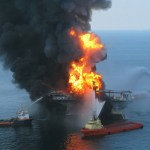Exxon Valdez
Sometimes, when I look at the things the Republicans and their leader, Donald Trump, are doing, I think of that poignant line in so many actual and fictional moments: "You have killed me."
Someone says that because the killing is done, but they are not yet dead. The knife is driven deep, the car is heading for the cliff, the contract killer is closing in. Then the person dies, but not before they get to say, "You killed me."
Today, I look at Donald Trump, the Koch Brothers, Rex Tillerson, the petroleum industry, the Heartland institute. They didn't kill me, but they have killed my daughter,…
Dan Rather was the newscaster. His lead for the CBS Evening News on Friday, March 24, 1989 was:
"An oil tanker ran aground today off the nation's northern most ice-free port, Valdez, Alaska."
The Exxon vessel was holding 53 million gallons of crude oil. By 3:30 am, the Coast Guard estimated that 5.8 million gallons had already been released from the tanker. Ultimately, nearly 11 million gallons of crude oil contaminated the region.
I was reminded of today’s 28th anniversary of the Exxon Valdez disaster by my colleague Mark Catlin. At the time he was with the Alaska Health Project, a non-…
Kyle Hopkins of McClatchy follows up on the question of how we learned from the Exxon Valdez disaster about long-term health effects experienced by cleanup workers. In short, we have no peer-reviewed studies on this important topic, even though occupational health experts called for long-term monitoring of workers. Hopkins writes:
Exxon has consistently maintained that there's no evidence spill workers experienced any adverse health effects as a result of the cleanup. Spokeswoman Cynthia Bergman said she isn't aware of any long-term study the company conducted on its own.
"The challenge is…
